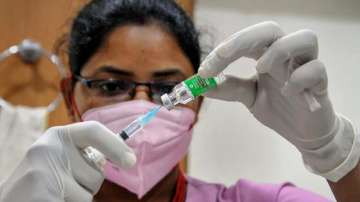India to receive COVID vaccine doses under global distribution strategy soon: US
Responding to a query on where would India stand on US vaccine distribution, Smith said India will be central and a key partner, stressing on US-India partnership in the Quad vaccine initiative.

India is set to receive COVID vaccine doses "soon" through the US government's global distribution strategy, a State Department official said, however, adding that the number of doses and the timeline are still being worked out. US State Department Coordinator for Global COVID Response, Gayle Smith, said that the goal of vaccine distribution is to get "global coverage".
US State Department Coordinator for Global COVID Response Gayle Smith has said, "So initially what we have been looking at is how can we lay the first layer of global coverage. The second is how do we think about hotspots where there is a high risk where countries may be on the precipice of a surge and we need to move swiftly. And then third, we are trying to be responsive to the many requests that we have gotten, including from our immediate neighbors, so that we can up that coverage."
Responding to a query on where would India stand on US vaccine distribution, Smith said India will be central and a key partner, stressing on US-India partnership in the Quad vaccine initiative.
"We are making an investment in increased production capacity in India but there are two other critical pieces of this, one is that in our shared doses India will be receiving additional vaccines from the United States. And the second is that we will continue to respond and I am really pleased that we have also seen a quite prolific response from the American private sector to the emergency needs in India, given the surge that India has gone through," she said.
United States President Joe Biden recently announced a donation of 500 million doses of the Pfizer COVID-19 vaccine to the world's poorest countries to help speed the pandemic's end.
The United States recently shared a framework for the distribution of 80 million vaccines globally to address potential surges and the needs of the most vulnerable countries affected by the pandemic
The Biden administration has announced the allocation of the first tranche of 25 million COVID-19 vaccines globally including India.
Seven million doses will be sent to some Asian countries including India, Nepal, Bangladesh, Pakistan and Sri Lanka.
Biden's appointed person on a US vaccine diplomatic push, Smith added that no decision has yet been made either on how many doses could be dispatched to India.
"We have got to do a few things we have got to make sure that the country has approved the vaccine we may have on offer, we have got to go through various regulatory, legal and safety checks before the vaccines are removed," Smith said.
Smith is a former USAID director, who has worked with some of the world's largest aid organisations. Now, President Biden has put her in charge of efforts to help share COVID-19 doses, the top official underscored President Biden's commitment to move these doses by the end of the month.
"So they will be arriving soon. We will go through all those steps with the Government of India, and then make those allocations, but I want to underscore something the President said when he announced that we are moving out of the first 25 million. This is only the start."
Smith emphasised the US is working closely with India and will sync the allocations of doses based on India's vaccination plans and will make efforts to match the vaccines in its supply with India's immunisation programme and cold-chain capabilities.
"There are multiple kinds of vaccines out there, they have different requirements to dose regimens, which are slightly more complicated. Some of the vaccines need cold chains that in many countries are already in place because of saying childhood vaccines and familiarity with vaccine programs," she said.
"In other cases, there may need to be an upgrade to that vaccine storage system. So that's how we determine what vaccines go where. So in the case of India or any other country that's part of the consultation to make sure we are making the best match for the most prompt and effective and efficient delivery," Smith added.
When asked on the status of the AstraZeneca vaccine approvals, Smith declined to set a timeframe for the Food and Drug Administration (FDA) giving its approval for the 60 million doses the US plans to donate but said the American side is hopeful the clearance will come soon explains the challenge before the US federal government.
"Its entirely inappropriate for the federal government to put pressure on a regulatory agency to speed the process, because then you could be accused of, you know, pressing them to skip some of the steps. So we are hopeful that that will come through soon, but we just have to wait and see when the FDA sends its signal right".
The slowdown in vaccinations across the United States has often been attributed to a blend of misinformation and mistrust among Americans known as "vaccine hesitancy."
Gayle stresses that vaccine hesitancy may be a challenge in the global distribution of vaccines.
" I think there are a few ways to get it. One is to make sure that we are all putting out regular science-based information to the public. The second very influential thing is trusted interlocutors," the American top official concluded.
(With ANI inputs)